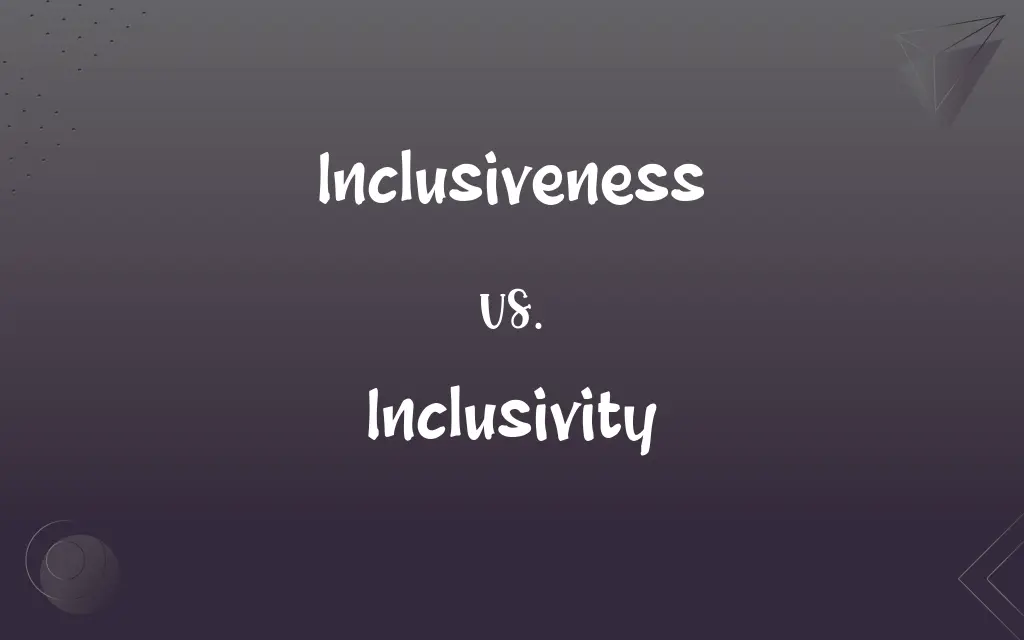Inclusiveness vs. Inclusivity: What's the Difference?
Edited by Aimie Carlson || By Harlon Moss || Updated on November 2, 2023
Inclusiveness is the practice of including people, inclusivity is the quality or state of being inclusive.

Key Differences
Inclusiveness is the action or policy of including people who might otherwise be excluded or marginalized, such as those who have physical or mental disabilities, come from different cultural backgrounds, or have various other identities. Inclusivity, on the other hand, is a characteristic or state of including a wide range of people, reflecting the ethos or atmosphere that results from inclusiveness.
Inclusiveness implies a deliberate effort or strategy to incorporate diverse groups into communities, workplaces, and organizations. It refers to tangible actions taken to ensure participation and representation. In contrast, inclusivity is the result or measure of such efforts, a measure of how open and accepting a community or environment is.
In terms of scope, inclusiveness can often be measured by specific initiatives and practices that promote diversity. Inclusivity is broader, signifying an overarching principle or value that informs behaviors and attitudes within a group or society.
The concept of inclusiveness often leads to practical steps like creating programs, adjusting designs, and enacting policies. Inclusivity is the broader cultural or social acceptance and integration that grows from these practical steps, representing a cultural goal or ideal.
When talking about inclusiveness, one might refer to specific inclusiveness training for employees. When discussing inclusivity, one would refer to the pervasive sense of belonging that permeates an organization, suggesting a deep-rooted commitment to including all.
ADVERTISEMENT
Comparison Chart
Definition
Practice of including diverse groups
Quality/state of being inclusive
Focus
Actions and initiatives
Ethos and atmosphere
Scope
Specific measures
Overall principle or characteristic
Measurement
By initiatives and policies
By cultural acceptance and integration
Outcome
Leads to inclusivity
Result of inclusiveness
ADVERTISEMENT
Inclusiveness and Inclusivity Definitions
Inclusiveness
The practice of including a diverse range of people.
The company's inclusiveness was evident in its diverse hiring policies.
Inclusivity
The state of encompassing all, without exclusion.
Inclusivity is a core value of modern democratic societies.
Inclusiveness
Actively involving minority or marginalized groups.
Inclusiveness in the workshop meant all voices were heard.
Inclusivity
An environment where differences are acknowledged and accepted.
Their inclusivity policy ensures people of all backgrounds can succeed.
Inclusiveness
An approach that ensures all individuals feel valued.
Her teaching methods are praised for their inclusiveness.
Inclusivity
The characteristic of being open to every individual.
The inclusivity of the community made everyone feel welcome.
Inclusiveness
Incorporation of a wide variety of ideas and identities.
The inclusiveness of the forum encourages a multitude of perspectives.
Inclusivity
The quality of including all sections of society.
Inclusivity in education helps reduce social inequalities.
Inclusiveness
The policy of providing equal access to opportunities and resources.
The new law mandated inclusiveness in all public buildings.
Inclusivity
A measure of how environments accommodate diverse populations.
The city’s inclusivity was reflected in its multicultural festivals.
Inclusiveness
Taking a great deal or everything within its scope; comprehensive
An inclusive survey of world economic affairs.
FAQs
Can a place be described as having inclusiveness?
Yes, if it takes active steps to include diverse groups.
Is inclusivity an outcome or a process?
Inclusivity is more of an outcome, reflecting an inclusive environment.
What does a lack of inclusivity indicate?
It suggests an environment that may not be accepting of or adaptable to diversity.
How can individuals contribute to inclusivity?
By being open-minded, embracing diversity, and advocating for inclusive practices.
What is inclusivity?
Inclusivity is the quality of being inclusive or a state where different groups are accepted.
How do you implement inclusiveness?
Through specific actions and policies that promote diversity and participation.
What are signs of inclusivity in society?
Broad cultural acceptance and the integration of diverse groups.
Can an organization have inclusiveness without inclusivity?
Yes, if actions are taken but the culture remains exclusive.
What role does leadership play in inclusivity?
Leaders set the tone and standards for an inclusive culture.
Can inclusiveness improve team performance?
Yes, as it can enhance collaboration and innovation.
Can inclusivity be felt by individuals?
Yes, individuals can feel inclusivity when they are accepted and valued for their unique attributes.
Does inclusiveness require continuous effort?
Yes, it requires ongoing commitment to inclusion practices.
Is inclusiveness a legal requirement?
In some areas, yes, particularly regarding accessibility and non-discrimination.
What are common barriers to inclusivity?
Prejudices, lack of awareness, and systemic inequalities can be barriers.
What is inclusiveness?
Inclusiveness is the practice or policy of including people from a range of different groups.
Why is inclusivity important in the workplace?
It creates an environment where all employees feel valued and able to contribute.
How do you measure inclusiveness?
By the presence and effectiveness of inclusion-based policies and practices.
How can schools promote inclusiveness?
By implementing inclusive educational practices and curriculum.
Are inclusiveness and diversity the same?
Not exactly; diversity is about variety, while inclusiveness is about the active inclusion of that variety.
How does inclusivity affect community services?
Services become more accessible and considerate of all community members.
About Author
Written by
Harlon MossHarlon is a seasoned quality moderator and accomplished content writer for Difference Wiki. An alumnus of the prestigious University of California, he earned his degree in Computer Science. Leveraging his academic background, Harlon brings a meticulous and informed perspective to his work, ensuring content accuracy and excellence.
Edited by
Aimie CarlsonAimie Carlson, holding a master's degree in English literature, is a fervent English language enthusiast. She lends her writing talents to Difference Wiki, a prominent website that specializes in comparisons, offering readers insightful analyses that both captivate and inform.
































































